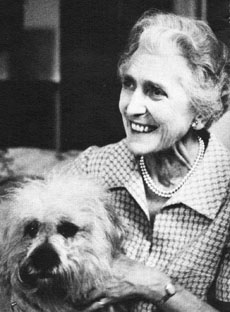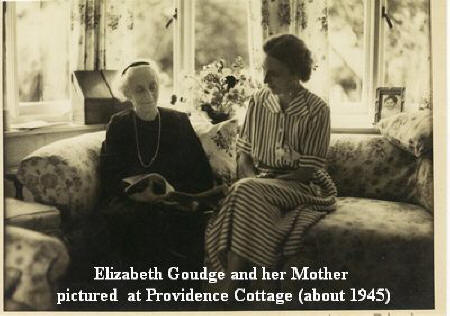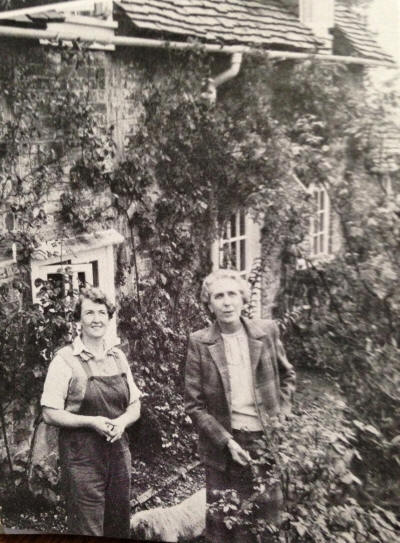

Partner Jessie Munroe
Queer Places:
Providence Cottage, Westerland Ln, Marldon, Paignton TQ3 1RU,
UK
Rose Cottage, Dog Ln, Peppard Common, Rotherfield Peppard, Henley-on-Thames RG9 5JY, UK
St Mary Magdalene Churchyard
New Milton, New Forest District, Hampshire, England
 Elizabeth de Beauchamp Goudge FRSL (24 April 1900 – 1 April 1984) was a British author of novels, short stories and children's books. She won the Carnegie Medal for British children's books in 1946 for The Little White Horse.[1] After her parents died Elizabeth lived with a companion, Jessie Munroe
(died 2007), and in 1952 they moved into Rose Cottage in Peppard Common near Henley-on-Thames.
The cottage is on Dog Lane which is very ancient, and was called Pack and Prime Lane, which it still is when it reaches Henley on Thames. Goudge was a popular author in both the UK and the US from the 1930s to the 1970s. She regained attention decades later. In 1993 one of her books was plagiarised by Indrani Aikath-Gyaltsen; the "new" novel set in India was warmly reviewed in The New York Times and The Washington Post before its source was discovered.[2] In 2001 or 2002 J. K. Rowling identified The Little White Horse as one of her favourite books and one of few with a direct influence on the Harry Potter series.[3][4]
Elizabeth de Beauchamp Goudge FRSL (24 April 1900 – 1 April 1984) was a British author of novels, short stories and children's books. She won the Carnegie Medal for British children's books in 1946 for The Little White Horse.[1] After her parents died Elizabeth lived with a companion, Jessie Munroe
(died 2007), and in 1952 they moved into Rose Cottage in Peppard Common near Henley-on-Thames.
The cottage is on Dog Lane which is very ancient, and was called Pack and Prime Lane, which it still is when it reaches Henley on Thames. Goudge was a popular author in both the UK and the US from the 1930s to the 1970s. She regained attention decades later. In 1993 one of her books was plagiarised by Indrani Aikath-Gyaltsen; the "new" novel set in India was warmly reviewed in The New York Times and The Washington Post before its source was discovered.[2] In 2001 or 2002 J. K. Rowling identified The Little White Horse as one of her favourite books and one of few with a direct influence on the Harry Potter series.[3][4]
Goudge was born on 24 April 1900 in Tower House in The Liberty of the cathedral city of Wells, where her father, Henry Leighton Goudge, was vice-principal of the Theological College. Her mother, Ida de Beauchamp Collenette (1874-1951) was originally from Guernsey. Ida met Henry while on holiday from there. The family moved to Ely when he became principal of the Theological College and then to Christ Church, Oxford when he was appointed Regius Professor of Divinity at the University. Elizabeth was educated at Grassendale School, Southbourne (1914–1918) and at the art school of University College Reading, then an extension college of Christ Church. She went on to teach design and handicrafts in Ely and Oxford.[5] After her father's death in 1939, Goudge and her mother moved into a bungalow in Marldon, Devon. They had planned a vacation there, but the outbreak of the Second World War led to them remaining. A local contractor built them a new bungalow in Westerland Lane, now known as Providence Cottage, where they lived for 12 years and she wrote several books, using Marldon based as a setting: Smoky House (1940), The Castle on the Hill (1941), Green Dolphin Country (1944), The Little White Horse (1946), and Gentian Hill (1949).[6] After her mother's death in 1951, she moved to Oxfordshire, spending the last 30 years of her life in a cottage on Peppard Common, outside Henley-on-Thames, where a blue plaque was unveiled in 2008.[7] She suffered with various health problems during the last years of her life – osteoarthritis and high blood pressure. In 1978 she had a fall in her cottage and injured her leg. After several more falls during the years and extended stays in the hospital in Reading, she died on 1 April 1984 in her beloved Rose Cottage.



Jessie Munroe and Elizabeth Goudge
Elizabeth Goudge was of the uncritical spinster daughters of the time between the two world wars. As an only child, she revered her parents. Her father, an ordained academic, was a pious, hard-working man, a vigorous, manly scholar of monk-like simplicity. Her mother was intrepid, charming, vivacious and something of a grande dame. But she too was ill. When Elizabeth was quite a small child, Ida Goudge collapsed with terrible pains in her head; some form of poisoning appeared to have nearly paralysed her and she could barely move. Ida’s youth was over, and from that time on, with periodic remissions, she was never well again. For her daughter, from then on, everything outside caring for her took second place. Elizabeth, a much-loved child, grew up surrounded by beauty, in Wells, Ely, Oxford and Hampshire. But her schooling was inadequate, and her memoirs reveal a kind of passive helplessness in the face of fate. In Ely, straight after the war, she fell in love. ‘It ended in tears, of course. Does not every first love end in tears?’ Parents of that era realised that unless their daughters had exceptional beauty and charm they would not marry. The First World War left few young men alive. The phrase used at that time, ‘the lost generation’, sounds poetical but it was the truth… And so at that time there were millions more women than men in England. Elizabeth had learnt to write passably, but that didn’t seem to offer prospects of earning a living. It turned out that she had a heart complaint and the arduous training for becoming a nurse would kill her. ‘So we had to think again.’ Ida now decided to have her daughter trained as a handicrafts teacher, but though she attempted for a while to instruct children in embroidery and leatherwork, Elizabeth found she missed home. As an invalid, Ida was living a confined life with one devoted servant on the Hampshire coast, her beloved husband joining her whenever he could be released from his work as Professor of Divinity in Oxford. And it was here at Barton-on-Sea that Elizabeth found herself as a writer. ‘My handicraft training was not now providing me with what I wanted, a home-based career so that I could be with my mother as much as possible…’ she recalled. Island Magic was written in a corner of her mother’s bedroom at Barton. The novel was acclaimed and her career as a writer blossomed, but at that period little else in her life proved fertile. At Barton her mother continued to be racked with pain and illness. Operations succeeded each other; after each one she nearly died. Elizabeth herself now fell into a pit of depression in which she doubted her faith and ultimately her own identity. This was followed by a terrifying nervous breakdown. Then in 1939 her father died. ‘Between my father and my mother the closeness had been lifelong. They had been almost one person. What the parting meant to her she allowed no one to know.’ Ida and Elizabeth now clung to each other like shipwrecked passengers; on their raft they were joined by the family nanny. The three of them moved to Devon. Here through the air raids of the 1940s mother and daughter shared a bed – ‘determined to be together whatever happened’. With the night-time bombers booming over nearby Plymouth, each super-stitiously clutched the object most precious to her: Ida, her jewel-case, and Elizabeth, the manuscript of what was to become her best-seller, Green Dolphin Country. After its publication in 1944 financial anxiety was at an end. For six devoted years after the war Elizabeth nursed her mother: a long, hard struggle, made worse by Ida’s mental collapse. She died at last in 1951. And now Elizabeth, in her fifties, was finally alone. But not quite alone. The index of Elizabeth Goudge’s autobiography includes an entry under ‘Dogs’. It lists the following: Brownie, Coach, Froda, Max, Randa, Swankie and Tiki – in total twenty-two pages cover a lifetime of fox terriers, half-breeds, spaniels, chows and Dandie-Dinmonts. Here, undoubtedly, Elizabeth found love. Brownie had a noble forehead and paced beside her with dignity on their walks. A ‘perfect being he had no faults and he loved deeply’. What human being could measure up to Brownie? Not quite so anthropomorphised, the three Dandies – Tiki, Randa and Froda – became known as the Hobbits. Like Tolkien’s sub-humans, they had ‘the art of disappearing swiftly and silently’, ‘and like the Hobbits they have large furry feet’. Each was loved in its own special way. Tiki, like a witch’s familiar, had special perceptions, and could always tell in advance when her mistress was coming home. Randa was ‘a beautiful filmstar, a fine lady who liked to pose on silken cushions’. Froda was ‘a fairy creature who appears and disappears like a gleam of sunshine, aloof and mysterious in her fantasy world.' I believe that the love we have for our animals insures their immortality for as long as the love lasts, wrote Elizabeth. In her memoirs, Elizabeth Goudge is voluble about love. She loved richly and profoundly, whether it was her family, her friends, her dogs or her Creator. But she never talks about sex. Are we to assume that she felt no deprivation, that she didn’t have needs in that respect? Were passion and desire strangers to her? A generation before, a woman’s sexuality would have been ignored, denied. But Elizabeth Goudge was born in 1900; can she, an intelligent, well-read woman, have been entirely oblivious of Freud, of D. H. Lawrence, of Marie Stopes and the psychologists? One thing is sure, whatever privations in this respect Miss Goudge may have learnt to live with, she felt no need to share them with her readers. The nearest she got to betraying any sense of physical shortfall was in describing the nervous breakdown she suffered when she was in her thirties. This followed on both her parents, and then she herself, undergoing surgery. Elizabeth endured guilt and misery at her mother’s illnesses, seeing Ida dealing with terrible pain and knowing how sorely that struggle tested her faith; but her own faith never wavered until she herself was called upon to endure: ‘It is when it touches your own flesh,’ my mother said once, ‘it is then that you know.’ It did not touch my flesh so badly as it touched my mind for after the little succession of family disasters I fell headlong into what is called a nervous breakdown, a state which as all its victims know can be terrifying. Depression, fear, confusion and suicidal tendencies engulfed an otherwise serene and rational woman. Perhaps it is far-fetched to suggest that a series of operations are an inadequate explanation for such a descent into mental illness. Whatever the case, a religious woman like Elizabeth Goudge certainly found it impossible to do anything other than hint at some indefinable blankness in her life. And any attempt to disinter the realities of living without sex in the first half of the twentieth century is liable to meet with the same obliqueness and avoidance. Elizabeth Goudge was a devout and obedient Christian; nevertheless Harding’s emphasis on love would have struck an answering chord. Drained dry after her mother’s death, the only thing that could replace that crucial relationship was a new and wonderful friendship: Without my mother’s vivid presence the place was dead… The weeks dragged by and kind friends came to visit me, but I lived in a dusty desert. Everything, I felt, had come to a dead end. There seemed no way out or through. Then the autumn came bringing with it what I suppose is the greatest miracle of every human life, the miracle of renewal…
Facing solitude was the hardest thing she had yet confronted. It was something of which she had no experience and, ignorant of her own inability to cope, she tried for a while to battle on. Friends saw that she was failing. One of these, determined to help, tried to persuade Elizabeth to write to a single woman she knew who she thought would keep her company, at least for a while. Doubtfully, she did so, receiving an equally doubtful reply, but a promise nonetheless to pass the winter in Devon. And in this way Jessie Munroe entered her life: I went out into the garden and heard a very clear voice saying the words that are now so delightfully familiar. ‘I’m sorry I’m late.’ We looked at each other. I saw an upright, capable-looking young woman with a head of hair like a horse-chestnut on fire, and the white magnolia skin that goes with such hair. Her eyes were very direct. She looked young enough to be my daughter and I doubted if she would stand me for long, yet when I went to bed that night to my astonishment I found myself flooded with happiness, and slept deeply. Jessie has stood me for twenty-one years and has been the most wonderful event that ever happened to me. Thus in her final home near Oxford, together with Jessie and a succession of adored dogs, Elizabeth Goudge found peace in advancing age to write, to remember and to reflect on what she had gained and given to life. Her autobiography, The Joy of the Snow, came out in 1974. In it she struggled honestly and scrupulously to balance out the joys and the sorrows. The realisation that she would not marry was mitigated for her by the sense that the women of her generation had value in the workforce; she would not have argued with Mrs Fawcett’s view that war had liberated a generation – and surely the ‘women’s libbers’ of the 1970s had missed the point? For people like her it had all happened fifty years earlier. And though it had taken many years and much regret – for above all she had found it hard to bear the thought that she would never have children – she had learned to ‘recognise and deeply prize the blessings of a single life’ and to feel grateful: For the childless woman there is no lack of children in the world to love, even if they are not her own, and nothing to prevent a single woman experiencing the richness of falling in love now and again all her life. And indeed it is richness, for to every human being the pain of perhaps not having love returned is less important than the blessed fact of loving. Elizabeth Goudge loved bountifully: her mother and her father, her nanny, her friends, the many strangers who wrote to her about her books, her dear dogs, Jessie Monroe, and above all her God. There had been loss, grief and heartache, but as the title of her autobiography suggests, in this woman’s life joy tipped the scales.
My published books: